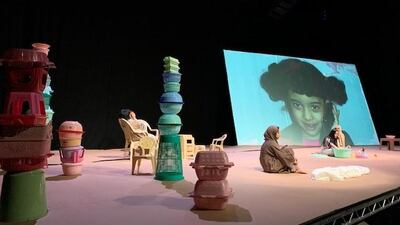A contemporary theatre performance exploring the bicultural reality of young Emirati women will be staged at NYU Abu Dhabi this weekend. Al Raheel/Departure was developed from a series of poems by Emirati writer Reem Almenhali and adapted to the stage by American director Joanna Settle. It features an all-women Emirati cast.
Co-commissioned by the Arts Centre at NYUAD and the Cultural Foundation, the performance was conceived after Almenhali brought three poems to Settle's directing class at the university.
"They made up about nine minutes of material," says Settle, who has taught at NYUAD since 2017. "Months later, I was still thinking about how interesting they were."
After sharing the work with other staff, Almenhali was commissioned to write new piece. "They took a chance and we launched forward on a very short timetable," Settle says.
The original poems, written in both Arabic and English, proposed three stages of life, from childhood to adulthood to old age. They became a point of departure for expanding the work. After four months of development, new material and shaping the work as a whole, the piece grew into a 50-minute production.
"We spent [the first] three months working 10 to 12 hours a week," Settle says. "We would research and talk, talk, talk. Aesthetically, we have a sense of memory, of women in progress along with their country and the performance environment."
Almenhali says she enjoyed the experience. "What's beautiful about making a piece on what influences the creation of your identity, is it prompts you to look for nuances in what you think is too familiar. It turns home into a place to explore," she says.
"Al Raheel addresses the multilingual or bilingual nature of this place in a way that shows how the duality of languages expands the possibilities for meaning."
The all-women cast is made up of bilingual students from Abu Dhabi, Sharjah and Ras Al Khaimah.
The set design features colourful plastic chairs, stacked baskets and upended bins. Settle says most of the props were collected during trips to souqs with set designer Marsha Ginsberg. "We wanted to consider objects the whole audience might relate to, but that we also found sculptural."
Al Raheel/Departure will be performed on Friday and Saturday, January 24 and 25 at The Arts Centre, NYUAD


